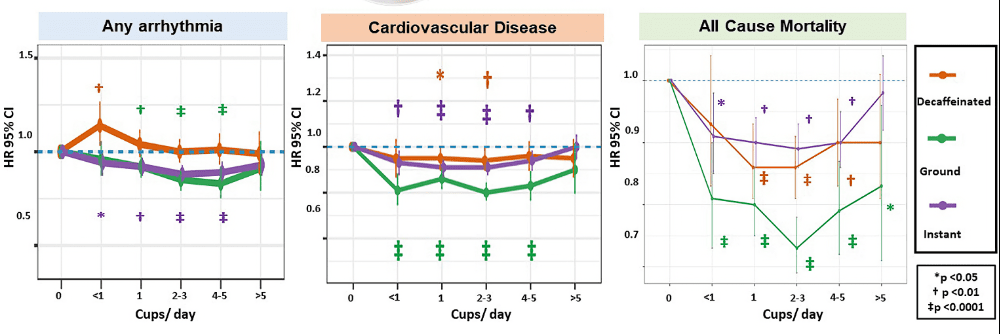By Dr. Timothy Swinn, edited by Dr. Ahmed El-Medany
Good news for coffee drinkers everywhere as a recent UK Biobank study published in the European Journal of Preventive Cardiology has shown that multiple types of coffee are associated with lower mortality, cardiovascular disease and arrhythmia incidence1. A study published in the same journal in January 2022 had concluded that coffee consumption of up to three cups per day was associated with favourable cardiovascular outcomes2, however Cheing and their co-authors went further to assess whether ground, instant and decaffeinated coffee were all associated with favourable outcomes compared to coffee non-drinkers. A multivariate analysis adjusting for confound cardiovascular risk factors was conducted on data from nearly 450,000 coffee-drinking participants (median age 58) covering a median 12.5 years.
All types of coffee were associated with reduction in all-cause mortality, which was in keeping with Simon et al’s study in January2. Ground coffee was associated with the greatest magnitude of mortality reduction (HR 0.73, CI 0.69-0.78, p<0.0001) however decaffeinated (HR 0.86, CI 0.81-0.91, p<0.0001) and instant coffee (HR 0.89, CI 0.86-0.93, p<0.0001) also showed benefits compared to coffee non-drinkers. Lowest rates were seen amongst participants who drank 2-3 cups of their preferred type of coffee. Similar results were seen for all coffee types on reduction of incident cardiovascular disease (Figure 1). The benefits across caffeinated and decaffeinated coffee suggests that the mechanism may involve any of the >100 non-caffeine biologically active compounds found in coffee.
Interestingly, caffeinated coffee (ground and instant coffee) was associated with lower incidence of arrhythmia than coffee non-drinkers, but decaffeinated coffee was not. The largest risk reduction was seen at 4-5 cups per day of ground coffee (HR 0.83, CI 0.76-0.91, p<0.0001) but notably both ground coffee and instant coffee had “U-shaped” curves, where arrhythmia incidence returned closer to the level of coffee non-drinkers for those drinking >5 cups per day. The authors suggest that caffeine may mediate its antiarrhythmic effects through inhibition of adenosine A1 and A2A receptors and protect against the arrhythmia risk from endogenous adenosine.
The increasing evidence of beneficial effects of coffee means we may be approaching the point where light-moderate coffee intake should be encouraged as part of a healthy lifestyle. Further research is required to assess the health impact of hospital foyer Costa and whether latte art is linked with lower AF burden.

References
- Chieng D, Canovas R, Segan L, Sugumar H, Voskoboinik A, Prabhu S, et al. The impact of coffee subtypes on incident cardiovascular disease, arrhythmias, and mortality: long-term outcomes from the UK Biobank. Eur J Prev Cardiol. 2022 Sep 27;zwac189.
- Simon J, Fung K, Raisi-Estabragh Z, Aung N, Khanji MY, Kolossváry M, et al. Light to moderate coffee consumption is associated with lower risk of death: a UK Biobank study. Eur J Prev Cardiol. 2022 Apr 1;29(6):982–91.

